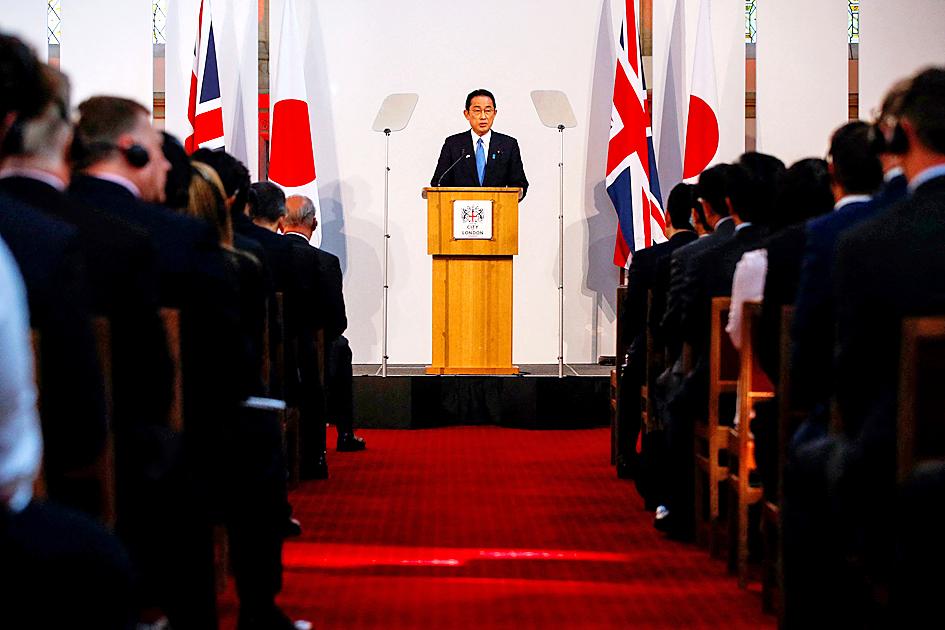Japanese Prime Minister Fumio Kishida yesterday said that Japan would use nuclear reactors to help reduce its own and other countries’ dependence on Russian energy.
Japan has become more reliant on Russian gas since shutting down nuclear reactors after the 2011 Fukushima Dai-ichi disaster in which an earthquake and tsunami triggered a meltdown, devastating its northeastern region.
However, facing elections in July and rising energy prices that are squeezing voters’ budgets, Kishida said nuclear would be part of the country’s future energy policy.

Photo: Reuters
‘SELF-SUFFICIENCY’
He said Japan would address the “vulnerability of our own energy self-sufficiency” by broadening where it buys energy from, promoting renewables and using nuclear power to diversify its sources of generation.
“We will utilize nuclear reactors with safety assurances to contribute to worldwide reduction of dependence on Russian energy,” Kishida told an audience in London’s financial district.
“Restarting just one existing nuclear reactor would have the same effect as supplying 1 million tonnes of new LNG [liquefied natural gas] per year to the global market,” he said.
More than a decade after the March 2011 earthquake and tsunami triggered the worst nuclear crisis since Chernobyl, nuclear power remains a difficult issue in Japan, where only a handful of its 30-odd plants are still operating.
However, a majority of the public and businesses want the government to restart nuclear reactors to address energy security, with the Ukraine crisis and higher energy costs having added momentum to that shift in opinion.
‘JAPAN IS A BUY’
Kishida addressed the City of London with the pro-investment messages: “Japan is a buy.”
He said ¥150 trillion (US$1.16 trillion) in investment would be raised in the next decade to meet its goals of carbon neutrality by 2050 and to reduce greenhouse gas emissions by 46 percent by 2030.
Kishida outlined a roadmap to 2030 focused on maximizing use of “pro-growth carbon pricing” and promotion of long-term projects.

‘IN A DIFFERENT PLACE’: The envoy first visited Shanghai, where he attended a Chinese basketball playoff match, and is to meet top officials in Beijing tomorrow US Secretary of State Antony Blinken yesterday arrived in China on his second visit in a year as the US ramps up pressure on its rival over its support for Russia while also seeking to manage tensions with Beijing. The US diplomat tomorrow is to meet China’s top brass in Beijing, where he is also expected to plead for restraint as Taiwan inaugurates president-elect William Lai (賴清德), and to raise US concerns on Chinese trade practices. However, Blinken is also seeking to stabilize ties, with tensions between the world’s two largest economies easing since his previous visit in June last year. At the

UNSETTLING IMAGES: The scene took place in front of TV crews covering the Trump trial, with a CNN anchor calling it an ‘emotional and unbelievably disturbing moment’ A man who doused himself in an accelerant and set himself on fire outside the courthouse where former US president Donald Trump is on trial has died, police said yesterday. The New York City Police Department (NYPD) said the man was declared dead by staff at an area hospital. The man was in Collect Pond Park at about 1:30pm on Friday when he took out pamphlets espousing conspiracy theories, tossed them around, then doused himself in an accelerant and set himself on fire, officials and witnesses said. A large number of police officers were nearby when it happened. Some officers and bystanders rushed

Beijing is continuing to commit genocide and crimes against humanity against Uyghurs and other Muslim minorities in its western Xinjiang province, U.S. Secretary of State Antony Blinken said in a report published on Monday, ahead of his planned visit to China this week. The State Department’s annual human rights report, which documents abuses recorded all over the world during the previous calendar year, repeated language from previous years on the treatment of Muslims in Xinjiang, but the publication raises the issue ahead of delicate talks, including on the war in Ukraine and global trade, between the top U.S. diplomat and Chinese

RIVER TRAGEDY: Local fishers and residents helped rescue people after the vessel capsized, while motorbike taxis evacuated some of the injured At least 58 people going to a funeral died after their overloaded river boat capsized in the Central African Republic’s (CAR) capital, Bangui, the head of civil protection said on Saturday. “We were able to extract 58 lifeless bodies,” Thomas Djimasse told Radio Guira. “We don’t know the total number of people who are underwater. According to witnesses and videos on social media, the wooden boat was carrying more than 300 people — some standing and others perched on wooden structures — when it sank on the Mpoko River on Friday. The vessel was heading to the funeral of a village chief in